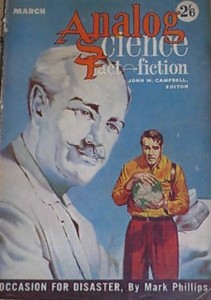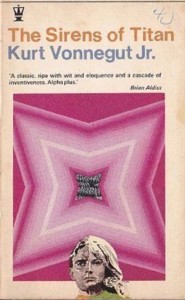17 July 2016
I recently discussed with Sydney the many changes that took place in Science-fiction writing over the period covered by the Hawke strip and how these changes are themselves reflected in the evolving themes and emphases in the strip.
In the nineteen fifties the solar system was a very different place, at least for the writers of Sci-fi. The carbon cloud covering the surface of Venus hid dense jungles which were the home of exotic giant reptiles, while Mars, although visibly lifeless , showed even from Earth , the traces of its dead or dying civilisation in the form of its canal network . Stronger telescopes or future spacecraft would doubtless reveal the delicate city spires, described by Bradbury and others. Our future as a spacefaring species was very near at hand. Science fiction , both pulp and serious, reflected this optimism about our destiny among the planets. The change in this vision was slow but inexorable and occurred by degree through the succeeding decades. Sydney and I discussed this change and there seems to have been two key turning points which accelerated it. Firstly the winning of the space race by the USA , after which most of the public enthusiasm for space travel, which had been boundless until that point, seemed to dissipate, and the rest of the Apollo
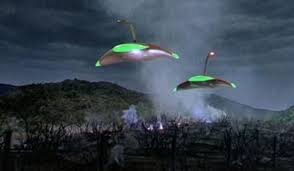
missions appeared technical and anticlimactic. The second key event was the first close-up flyby of Mars by Mariner 4 in 1965, whose relayed pictures showed the red planet to be a lifeless and frozen desert, cratered and moon-like. Fact had replaced imagination and like the cartographers of the eighteenth century we could no longer write “here be dragons” on any part of the Martian surface. Science fiction also reflected this change in the public attitude and as time went on , itself became more reflective and introspective. The bright worlds envisioned in the fifties , with their gleaming domed cities , personal jet cars and regular shuttles to the moon and Mars were replaced by gloomy distopias . These new visions of the future were also fuelled by the increasing preoccupation with environmental degradation and the finite supply of fossil fuels. Covering, as it does, the whole span of these decades , the Jeff Hawke strip , almost uniquely, plots this change in the content of its stories and it’s
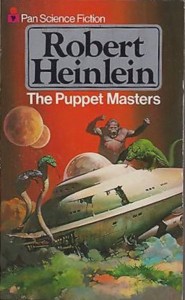
changing attitudes and preoccupations . Obviously there is not a continuous trend from one story to the next and Messrs Jordan and Patterson had their own unique take on all these themes, but taken as a whole body of work the Hawke strips serve as a barometer for this fundamental change in the way science-fiction developed. SPACERIDER, the earliest story, gives a nod to Alex Raymond and the space stories of an earlier era , the prime examples of which are Buck Rogers and Flash Gordon, while Sydney’s MARTIAN INVASION plugs into that popular invasion theme of the fifties engendered by the 1953 movie version of H G Wells classic and the fear of the Soviet Union. Heinlein’s PUPPET MASTERS (1951)and Arthur Clarke’s Childhood’s end(1953) are also contemporary examples of this.
As scientific research progressed and the likelihood of Solar System life receded ever more, sci-fi had to look further afield to place its aliens and other star systems became their natural choice. The Hawke strip used the setting of Proxima Centauri , one of our near galactic neighbours for the DREAM PEDLARS series .
Another popular trope became the theme of ancient aliens visiting Earth in its distant
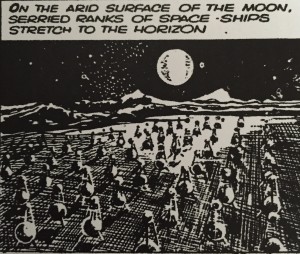
past, an idea made popular at the time by Velikovsky’s WORLDS IN COLLISION and later by CHARIOTS OF THE GODS . Kurt Vonnegut uses this theme of ancient aliens influencing the destiny of our species in his SIRENS OF TITAN (1959) and Arthur Orton in his influential short story THE FOUR_FACED VISITORS OF EZEKIEL (1961) explores the possibility of alien encounters in the ancient lands of the bible.This popular theme was reflected in such JH stories as SACRIFICE, THE WONDROUS LAMP and THE IMMORTAL TOYS, though in his case Sydney anticipated rather than followed the trend .
To be continued Skippet Prossitt
